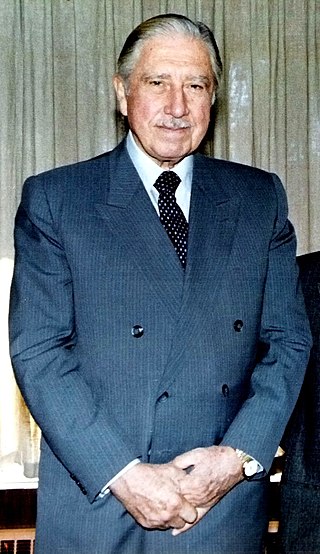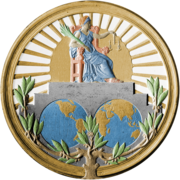
The International Criminal Court is an intergovernmental organization and international tribunal seated in The Hague, Netherlands. It is the first and only permanent international court with jurisdiction to prosecute individuals for the international crimes of genocide, crimes against humanity, war crimes and the crime of aggression. The ICC is distinct from the International Court of Justice, an organ of the United Nations that hears disputes between states.
Jurisdiction is the legal term for the legal authority granted to a legal entity to enact justice. In federations like the United States, the concept of jurisdiction applies at multiple levels.
Sovereign immunity, or crown immunity, is a legal doctrine whereby a sovereign or state cannot commit a legal wrong and is immune from civil suit or criminal prosecution, strictly speaking in modern texts in its own courts. State immunity is a similar, stronger doctrine, that applies to foreign courts.
Universal jurisdiction is a legal principle that allows states or international organizations to claim criminal jurisdiction over an accused person regardless of where the alleged crime was committed, and regardless of the accused's nationality, country of residence, or any other relation to the prosecuting entity. Crimes prosecuted under universal jurisdiction are considered crimes against all, too serious to tolerate jurisdictional arbitrage. The concept of universal jurisdiction is therefore closely linked to the idea that some international norms are erga omnes, or owed to the entire world community, as well as to the concept of jus cogens – that certain international law obligations are binding on all states.
Parliamentary immunity, also known as legislative immunity, is a system in which political leadership position holders such as president, vice president, minister, governor, lieutenant governor, speaker, deputy speaker, member of parliament, member of legislative assembly, member of legislative council, senator, member of congress, corporator, councilor etc. are granted full immunity from legal prosecution, both civil prosecution and criminal prosecution, in the course of the execution of their official duties.
Abdoulaye Yerodia Ndombasi was a Congolese politician who served in the government of the Democratic Republic of the Congo as Minister of Foreign Affairs from 1999 to 2000 and as Vice-President from 2003 to December 2006.

The Bosnian genocide refers to either the Srebrenica massacre or the wider crimes against humanity and ethnic cleansing campaign throughout areas controlled by the Army of Republika Srpska (VRS) during the Bosnian War of 1992–1995. The events in Srebrenica in 1995 included the killing of more than 8,000 Bosniak men and boys, as well as the mass expulsion of another 25,000–30,000 Bosniak civilians by VRS units under the command of General Ratko Mladić.

The Vienna Convention on Consular Relations is an international treaty that defines a framework for consular relations between sovereign states. It codifies many consular practices that originated from state custom and various bilateral agreements between states.

International criminal law (ICL) is a body of public international law designed to prohibit certain categories of conduct commonly viewed as serious atrocities and to make perpetrators of such conduct criminally accountable for their perpetration. The core crimes under international law are genocide, war crimes, crimes against humanity, and the crime of aggression.

Jean-Pierre Bemba Gombo is a politician in the Democratic Republic of the Congo (DRC). He has served as the DRC's Vice Prime Minister and defence minister since 2023. He was previously one of four vice-presidents in the transitional government of the Democratic Republic of the Congo from 17 July 2003 to December 2006. He led the Movement for the Liberation of the Congo (MLC), a rebel group turned political party. He received the second-highest number of votes in the 2006 presidential election. In January 2007, he was elected to the Senate.

Bosnia and Herzegovina v Serbia and Montenegro [2007] ICJ 2 is a public international law case decided by the International Court of Justice.
Thomas Lubanga Dyilo is a convicted war criminal from the Democratic Republic of the Congo (DRC) and the first person ever convicted by the International Criminal Court (ICC). He founded and led the Union of Congolese Patriots (UPC) and was a key player in the Ituri conflict (1999–2007). Rebels under his command have been accused of massive human rights violations, including ethnic massacres, murder, torture, rape, mutilation, and forcibly conscripting child soldiers.

The International Criminal Court has The International Criminal Court has opened investigations in Afghanistan, the Central African Republic, Côte d'Ivoire, Darfur in Sudan, the Democratic Republic of the Congo, Kenya, Libya, Uganda, Bangladesh/Myanmar, Palestine, the Philippines, and Venezuela. Additionally, the Office of the Prosecutor conducted preliminary examinations in situations in Bolivia, Colombia, Guinea, Iraq / the United Kingdom, Nigeria, Georgia, Honduras, South Korea, Ukraine and Venezuela. Preliminary investigations were closed in Gabon; Honduras; registered vessels of Comoros, Greece, and Cambodia; South Korea; and Colombia on events since 1 July 2002.

Immunity from prosecution is a doctrine of international law that allows an accused to avoid prosecution for criminal offences. Immunities are of two types. The first is functional immunity, or immunity ratione materiae. This is an immunity granted to people who perform certain functions of state. The second is personal immunity, or immunity ratione personae. This is an immunity granted to certain officials because of the office they hold, rather than in relation to the act they have committed.

General Augusto Pinochet was indicted for human rights violations committed in his native Chile by Spanish magistrate Baltasar Garzón in 1998. He was arrested in London six days later and held on house arrest for a year and a half before being released by the British government in 2000. Authorised to return to Chile, Pinochet was subsequently indicted by judge Juan Guzmán Tapia and charged with several crimes. He died in 2006 without having been convicted. His arrest in London made the front pages of newspapers worldwide; not only did it involve the head of the military dictatorship that ruled Chile between 1973 and 1990, it marked the first time judges had applied the principle of universal jurisdiction, declaring themselves competent to judge crimes committed in a country by former heads of state, despite the existence of local amnesty laws.
Mathieu Ngudjolo Chui is a colonel in the Congolese army and a former senior commander of the National Integrationist Front (FNI) and the Patriotic Resistance Force in Ituri (FRPI).

Jurisdictional Immunities of the State was a case concerning the extent of state immunity before the International Court of Justice. The case was brought by Germany after various decisions by Italian courts to ignore the state immunity of Germany when confronted with claims against Germany by victims of Nazi-era war crimes. The court found that Italy was wrong to ignore German immunity, and found that Italy was obligated to render the decisions of its courts against Germany without effect.

The International Criminal Court investigation in Ukraine or the Situation in Ukraine is an ongoing investigation by the Prosecutor of the International Criminal Court (ICC) into "any past and present allegations of war crimes, crimes against humanity or genocide committed on any part of the territory of Ukraine by any person" during the period starting "from 21 November 2013 onwards", on an "open-ended basis", covering the Revolution of Dignity, the Russo-Ukrainian War including the 2014 annexation of Crimea by Russia, the war in Donbas and the 2022 Russian invasion of Ukraine. The ICC prosecutor commenced these investigations on 2 March 2022, after receiving referrals for the situation in Ukraine from 39 ICC State Parties.

Allegations of Genocide under the Convention on the Prevention and Punishment of the Crime of Genocide is a case brought before the International Court of Justice (ICJ), the principal judicial organ of the United Nations. It was submitted by Ukraine on 26 February 2022 against Russia following the latter's invasion of Ukraine in 2022, which Russia sought to justify in part by claims that Ukraine was engaged in acts of genocide within the Luhansk and Donetsk oblasts. Ukraine said that these claims gave rise to a dispute under the 1948 Convention on the Prevention and Punishment of the Crime of Genocide, and based its application on the ICJ's jurisdiction to resolve disputes involving the convention. On 16 March 2022, the court ruled that Russia must "immediately suspend the military operations" in Ukraine, while waiting for the final decision on the case.










